Filter by
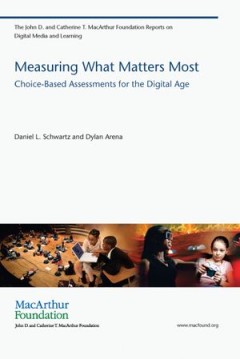
Measuring What Matters Most : Choice-Based Assessments for the Digital Age
An argument that choice-based, process-oriented educational assessments are more effective than static assessments of fact retrieval. If a fundamental goal of education is to prepare students to act independently in the world—in other words, to make good choices—an ideal educational assessment would measure how well we are preparing students to do so. Current assessments, however, focus alm…
- Edition
- -
- ISBN/ISSN
- 9780262518376
- Collation
- 192 halaman
- Series Title
- -
- Call Number
- 370 SCH m
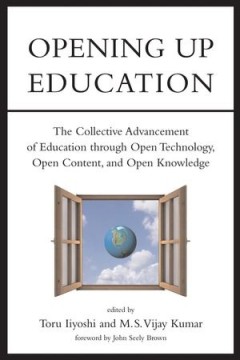
Opening Up Education : The Collective Advancement of Education through Open T…
Experts discuss the potential for open education tools, resources, and knowledge to transform the economics and ecology of education. Given the abundance of open education initiatives that aim to make educational assets freely available online, the time seems ripe to explore the potential of open education to transform the economics and ecology of education. Despite the diversity of tools and r…
- Edition
- -
- ISBN/ISSN
- 9780262033718
- Collation
- 500 halaman
- Series Title
- -
- Call Number
- 370 OPE
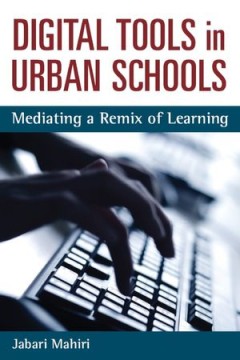
Digital Tools in Urban Schools : Mediating a Remix of Learning
The digital age and the age of hip-hop emerged collaterally during the last 35 years. Increasingly, young people in the United States and globally use screen-based, digital technologies to source and transmit words, images, video, and sounds as they engage in meaning making, identity connections, and social networking. They come to school with experiences, interests, affinities, and skills uniq…
- Edition
- -
- ISBN/ISSN
- 9780472900305
- Collation
- 170 halaman
- Series Title
- -
- Call Number
- 370 MAH d
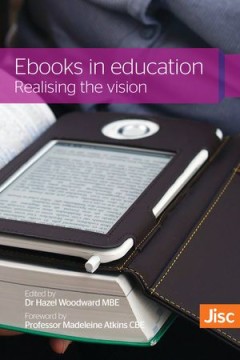
Ebooks in education : Realising the vision
Ebooks are coming of age in education, as this exciting collection commissioned by Jisc demonstrates. Case studies, reflecting ebook success stories across the higher and further education sectors, include: An innovative app to encourage ebook take-up in a Welsh college; A partnership between a library and research centre to create open access monographs and midigraphs; Several examples of crea…
- Edition
- -
- ISBN/ISSN
- 9781909188389
- Collation
- 144 halaman
- Series Title
- -
- Call Number
- 020 WOO e
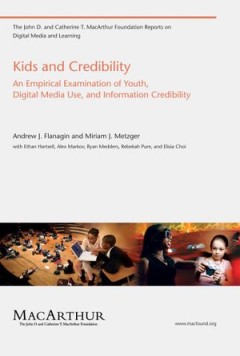
Kids and Credibility : An Empirical Examination of Youth, Digital Media Use, …
Findings from a survey of youthful Internet users that was designed to assess kids' beliefs about the credibility of online information. How well do children navigate the ocean of information that is available online? The enormous variety of Web-based resources represents both opportunities and challenges for Internet-savvy kids, offering extraordinary potential for learning and social connecti…
- Edition
- -
- ISBN/ISSN
- 9780262514750
- Collation
- 154 halaman
- Series Title
- -
- Call Number
- 302 FLA k
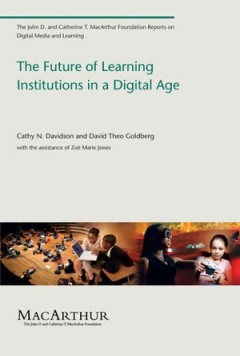
The Future of Learning Institutions in a Digital Age
In this report, Cathy Davidson and David Theo Goldberg focus on the potential for shared and interactive learning made possible by the Internet. They argue that the single most important characteristic of the Internet is its capacity for world-wide community and the limitless exchange of ideas. The Internet brings about a way of learning that is not new or revolutionary but is now the norm for …
- Edition
- -
- ISBN/ISSN
- 9780262513593
- Collation
- -
- Series Title
- -
- Call Number
- 370 DAV f
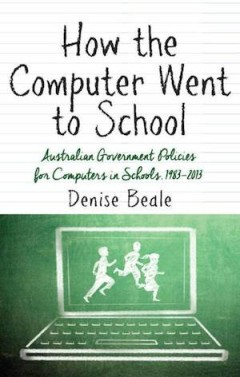
How the Computer went to School : Australian Government Policies for Computer…
For more than 30 years, certain governments, individuals and organisations have actively promoted computers as learning technologies. Enormous amounts of money and time have been spent promoting specific kinds of educational computing, and policies by which these might be implemented. The view that computers can enhance student learning has gained broad acceptance. The computers should not auto…
- Edition
- -
- ISBN/ISSN
- 9781922235169
- Collation
- -
- Series Title
- -
- Call Number
- 370 BEA h
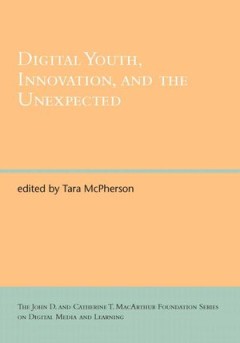
Digital Youth, Innovation, and the Unexpected
How emergent practices and developments in young people's digital media can result in technological innovation or lead to unintended learning experiences and unanticipated social encounters. Young people's use of digital media may result in various innovations and unexpected outcomes, from the use of videogame technologies to create films to the effect of home digital media on family life. This…
- Edition
- -
- ISBN/ISSN
- 9780262134958
- Collation
- 269 halaman
- Series Title
- -
- Call Number
- 305 MCP d
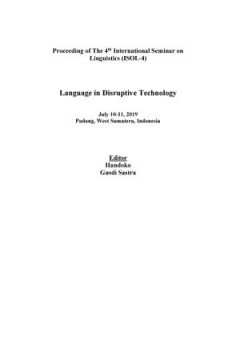
Thumbnail for Proceeding of The 4th International Seminar on Linguistics (ISO…
The rapid development of technology has led to a borderless community which may affect social life, including language. Through the disruptive technology of the era, the issue of language use and how technology affects language has arisen as a critical aspect of human communication. The current ISOL-4 tries to bring the issues of Language and Disruptive Technology to academic discussion.
- Edition
- -
- ISBN/ISSN
- 9783110680027
- Collation
- -
- Series Title
- -
- Call Number
- -
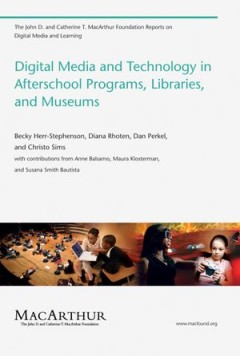
Digital Media and Technology in Afterschool Programs, Libraries, and Museums
An investigation of how three kinds of youth organizations have integrated digital practices into their programs. Digital media and technology have become culturally and economically powerful parts of contemporary middle-class American childhoods. Immersed in various forms of digital media as well as mobile and Web-based technologies, young people today appear to develop knowledge and skills th…
- Edition
- -
- ISBN/ISSN
- 9780262515764
- Collation
- -
- Series Title
- -
- Call Number
- -
 Computer Science, Information & General Works
Computer Science, Information & General Works  Philosophy & Psychology
Philosophy & Psychology  Religion
Religion  Social Sciences
Social Sciences  Language
Language  Pure Science
Pure Science  Applied Sciences
Applied Sciences  Art & Recreation
Art & Recreation  Literature
Literature  History & Geography
History & Geography